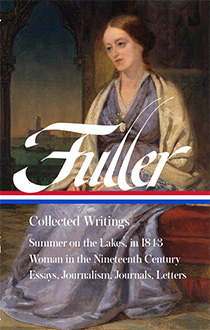Megan Marshall: Margaret Fuller is part of what you might call the Transcendentalist triumvirate of Emerson, Thoreau, and Fuller. But Fuller is a much more complicated figure. She didn’t “travel a good deal” in just one town, Concord, MA, as Thoreau said about himself, or feel, like Emerson, that “my giant goes with me wherever I go.” She moved on from New England, took on many new challenges, and while she was very much a part of that group, you cannot really peg her as one kind of writer—not an essayist, not a novelist.
Brigitte Bailey: We often think of Fuller as writing two books, Summer on the Lakes, in 1843 and Woman in the Nineteenth Century, but most of her published work appeared in periodicals right at the moment when print culture, especially newspapers and magazines, was exploding in the United States. When she moved from Boston to New York to write for Horace Greeley’s New-York Tribune after editing the Transcendentalist magazine The Dial, she tried to explain to her friends why she was leaving the higher calling of philosophical prose to write for a newspaper. By shifting, in part, from analyzing the works of “genius” (such as Goethe) in The Dial to writing for a burgeoning newspaper-reading audience, she embraced the popular press as a public intellectual who saw the medium’s potential for what she called, in a letter to James Freeman Clarke, the “great work of mutual education.” Her writing became more direct and more political. But she also integrated some of her earlier philosophical concerns into the more direct style of journalism—as during her reporting of the Siege of Rome.
MM: In 1846, Fuller traveled to Europe with a commission from the Tribune to report on what she saw and experienced. By 1848 there were revolutions across Europe, and she was in Rome for the rise and fall of the second Republic. By then she was much more than a reporter; she was fully integrated with the cause, personally and politically. She’d fallen in love with a young soldier in the Civic Guard, Giovanni Ossoli, with whom she had a child, in secret, so she could avoid scandal and continue her political reporting. She supervised a hospital, overseeing care of the wounded when French troops laid siege to the city and eventually overthrew the Republic, restoring the Pope to power. She was there for all of it, engaged in a way that is absolutely inspiring. For Fuller, this was “my America,” the moment of revolutionary glory she’d been born too late to experience back home.
